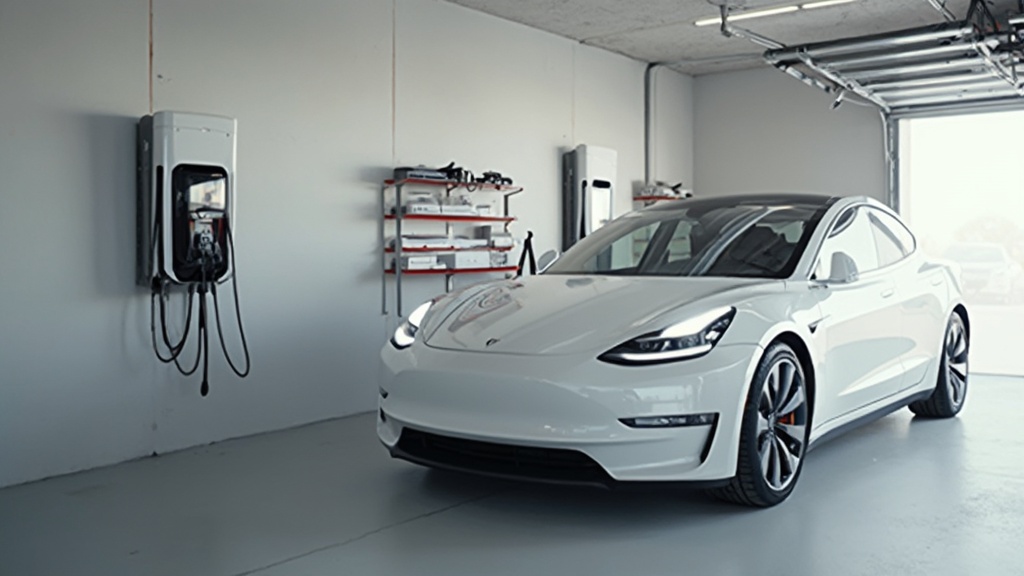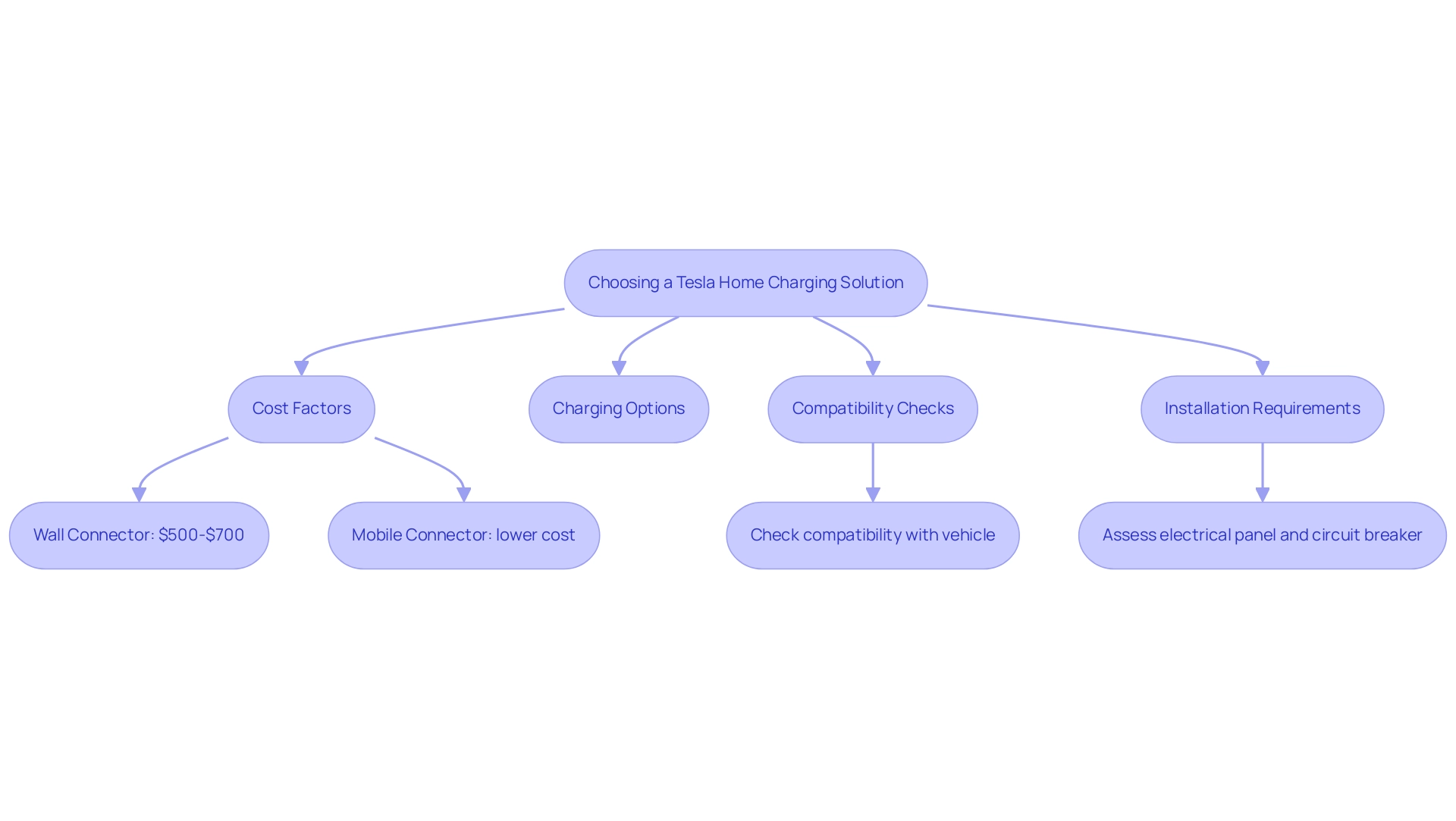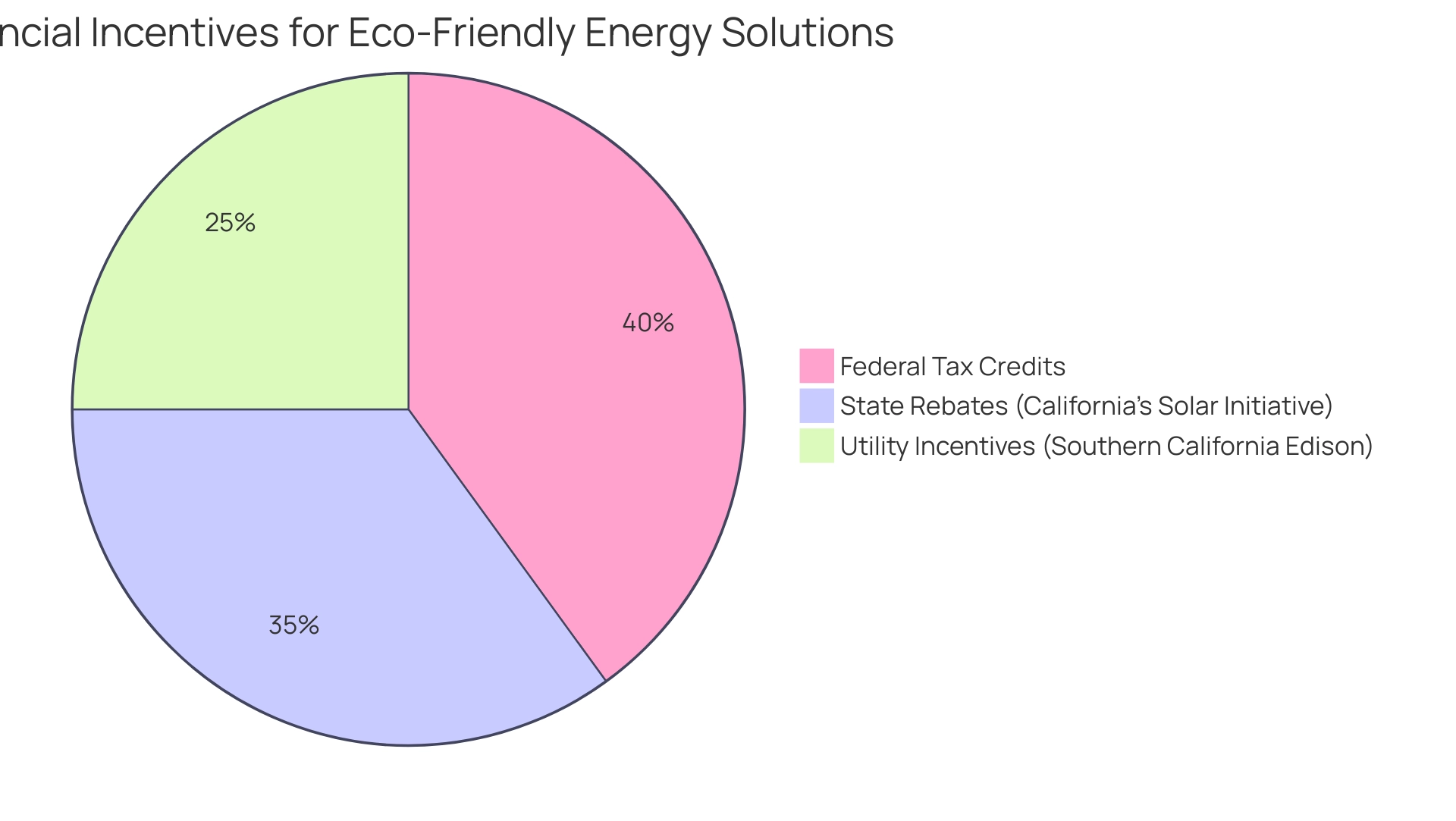Introduction
For homeowners considering the leap into electric vehicle ownership, installing a Tesla home charger can be a game changer. Not only does it provide the convenience of charging at home, but it also enhances the overall aesthetic of a modern garage. However, the journey to installation can be filled with questions about costs, options, and potential savings.
From understanding the various charging solutions Tesla offers to navigating the complexities of installation expenses and exploring available incentives, this guide aims to illuminate the path forward. Whether it’s evaluating the practicality of a Wall Connector versus a Mobile Connector or uncovering financial benefits through government programs, homeowners can feel empowered to make informed decisions that align with their sustainable lifestyle.
Understanding Tesla Home Charger Installation Costs
Installing a Tesla home charging station not only makes powering your electric vehicle convenient but also enhances your modern garage aesthetic. The installation typically involves several cost components, contributing to the overall home Tesla charger cost, including:
- Equipment
- Labor
- Any necessary electrical upgrades
On average, for installation expenses varies from $800 to $1,500, depending on the complexity of the installation and the model of the charging device.
Homeowners should also consider additional expenses, including:
- Home Tesla charger cost
- Permits
- Inspections
These can vary by location. Furthermore, investigating government solar panel initiatives can offer financial benefits for homeowners seeking to incorporate solar solutions with their Tesla devices. The image illustrates a contemporary garage environment displaying two electric car chargers affixed to a white wall, highlighting the elegant design of the chargers and a white electric car, which enhances the eco-friendly lifestyle.
By grasping these components, you can make educated choices regarding your electric vehicle power requirements while also contemplating how solar energy options can improve your residence.
Exploring Tesla Home Charging Options and Their Costs
Tesla provides a range of home power solutions that cater to various needs and budgets. The typical [home Tesla charger cost](https://gopowercoreinc.com/general/what-is-the-average-cost-to-install-a-tesla-charger-a-comprehensive-overview) for ranges from $500 to $700. Created for quick power replenishment, it can be set up in both indoor and outdoor spaces, making it adaptable for many eco-conscious homeowners.
However, it’s important to note that control over charging—specifically, how much charge goes into your transport—can vary, particularly when considering compatibility with third-party transports. For instance, users of non-Tesla automobiles, such as those utilizing the Ford charger through the FordPass app, have reported challenges that emphasize the need for thorough compatibility checks. One user voiced doubt regarding activating power for their Audi Q5e, highlighting possible obstacles for homeowners who might explore different electric transport alternatives.
Grasping these dynamics is crucial, as the station’s predictability may not always correspond with the unit it’s linked to.
On the other hand, the Mobile Connector, which is included with the unit, enables you to power up using a standard outlet. While convenient, this method is slower and typically doesn’t require professional installation, making it ideal for those looking to save on upfront costs. However, before making a decision on the home Tesla charger cost, consider your existing electrical infrastructure.
Upgrades to your electrical panel or circuit breaker may be necessary for a safe and effective installation, which can impact the home Tesla charger cost. It’s crucial to understand these requirements for a successful installation, especially with the latest models and their capabilities, considering the home Tesla charger cost. By weighing your options and their associated costs—including the implications of your vehicle’s compatibility and charging control features—you’ll be better equipped to choose a charging solution that seamlessly integrates into your eco-conscious lifestyle. Moreover, exploring government programs that support solar energy adoption can further enhance your residence’s sustainability, while professional cleaning services can help maintain your solar panels for optimal performance, ensuring that your investment in solar energy is protected and effective.
Factors Influencing Installation Costs
When evaluating the installation of a Tesla residential charging station, several significant factors can influence the home Tesla charger cost. One significant element is the distance from your electrical panel to the power source. If your panel is far away, you might find yourself facing higher labor costs due to the need for longer wiring runs.
Many homes may also require electrical upgrades to accommodate a charger, which can further increase expenses. Local permitting fees can play a role as well, ensuring compliance with National Electrical Code (NEC) standards for safe installation. For instance, the average home Tesla charger cost for installation can range from $800 to $1,500, depending on these variables.
Our friendly neighbors at Powercore Electric specialize in this process, conducting thorough site assessments and necessary electrical upgrades before installing your EV refueling station. They also rigorously test the installation to ensure everything is functioning optimally before handing it over to you. As noted by industry experts, understanding these components can empower homeowners to budget effectively and prepare for the installation process.
A satisfied customer recently shared, ‘Powercore Electric made the installation process seamless and straightforward. I was impressed with their professionalism and thoroughness.’ Moreover, Tesla’s continuous growth of its Supercharger network, which has witnessed over 31,000 stations established in the US, highlights the significance of accessible power solutions, making it a timely consideration for those looking to embrace electric vehicle ownership.
By referencing Tesla’s Infrastructure Expansion, we see how partnerships, such as Hilton’s commitment to install , further illustrate the increasing demand for power solutions. By staying informed about these factors, you can make smart decisions that align with your sustainable lifestyle.
Potential Savings and Incentives
Many eco-conscious homeowners, particularly renters in Long Beach, may qualify for federal tax credits, state rebates, or utility incentives when considering eco-friendly energy solutions like solar panels and Tesla home charging devices. For instance, the federal government offers a tax credit for electric vehicle charging equipment, which can significantly reduce installation costs. California’s Solar Initiative offers cash rebates for , and local utility companies, like Southern California Edison, provide programs that can further decrease expenses for homeowners who set up charging devices.
These financial advantages not only make the investment in a Tesla charging station more economical, but they can also significantly affect the home Tesla charger cost and lead to savings over time. Furthermore, solar panels transform sunlight into electricity, which can energize both your residence and your electric vehicle, paving the way for a more sustainable lifestyle.
Long-Term Financial Benefits of Home Charging
Investing in a Tesla charger not only brings convenience but also offers substantial long-term financial benefits for eco-conscious property owners. By choosing electric power, you can significantly reduce fuel expenses, as electricity generally costs less than conventional gasoline. Additionally, charging at your residence allows you to take advantage of during off-peak hours, maximizing your savings even further.
Recent studies indicate that net savings from electric vehicle ownership can range from $7,000 to $11,000, largely due to lower operational costs. As emphasized in the insightful case study titled ‘Financial Benefits of Electric Vehicles,’ the long-term savings on gas and maintenance make the initial investment in a residential charger a smart financial move. Moreover, residences equipped with electric vehicle refueling features are becoming more attractive to purchasers, potentially increasing property worth in a market where environmentally friendly attributes are in great demand.
As noted by Self-Help, ‘That’s why we are offering EV loans with these communities in mind to make the switch to clean energy more affordable for everyone.’ This corresponds with the main idea that the overall expense of owning EVs is less than that of gasoline-powered vehicles, strengthening the case for residential recharging. Furthermore, reliable installation providers such as Qmerit, who have set up over 450,000 charging stations throughout North America, confirm that the shift towards residential charging is not merely a temporary trend—it’s a worthwhile investment in both your finances and your property.
The cost of a home Tesla charger typically ranges from $500 to $700, and various government programs may offer incentives or rebates to further reduce the home Tesla charger cost. Ready to make the switch to electric vehicles? Contact Powercore Electric today to learn more about our EV charging solutions and how we can help you embrace a cleaner, more sustainable future.
Conclusion
Investing in a Tesla home charger is a significant step toward embracing electric vehicle ownership while enhancing the value and functionality of your home. Understanding the various installation costs—ranging from equipment and labor to potential electrical upgrades—empowers homeowners to make informed choices that fit their budget and lifestyle. With options like the Wall Connector and Mobile Connector, it’s essential to evaluate your specific needs, including compatibility with different electric vehicles and your existing electrical infrastructure.
Moreover, the financial incentives available, such as federal tax credits and state rebates, can significantly reduce the overall cost of installation. Homeowners can reap substantial long-term savings by making the switch to electric, including lower fuel costs and potential increases in property value. Tesla’s ongoing expansion of its charging infrastructure only underscores the growing demand for accessible and convenient charging solutions.
In summary, the decision to install a Tesla home charger is not just about convenience; it’s about making a sustainable choice that benefits both the environment and your finances. By taking the time to explore options, costs, and potential savings, homeowners can confidently embrace a greener future, ensuring that their investment in electric vehicle charging aligns with their eco-friendly lifestyle.




